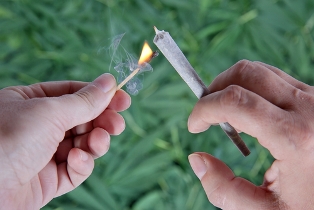
In an attention grabbing court case with national implications, Colorado’s supreme court has been tasked with resolving a very important question: Can an employee be fired for using marijuana outside of work?
This issue has been called into question by Brandon Coats, a 34-year-old quadriplegic medical marijuana patient from Colorado who was fired by Dish Network for his state-legal medical use in 2010. He made his case in Denver before the highest court in the state on Tuesday, arguing that employers should not be able to fire patients like himself for using their medicine legally and outside of the workplace.
Brandon says that he has not been able to find steady work since his termination in 2010. Brandon was paralyzed in a car crash as a teenager and after being urged by his doctor, he decided to use medical marijuana. The marijuana was successful in calming down the violent spasms brought on by the injury from the car accident.
Coats worked for three years as a telephone operator with Dish, where he was a model employee. He failed a random drug test in 2010 and was fired. He reportedly told his supervisors in advance that he probably would fail the test.
“I’m going to be like this for the rest of my life, and I don’t want to go through the rest of my life being unemployed,” Coats told CBS Denver last year.
The state law versus federal law issue has been brewing since marijuana was first legalized. While it is legal to purchase marijuana in many states; federally, it is still an illegal substance that could land you a healthy jail sentence in the eyes of federal law.
Coats’ case comes to the justices after a trial court judge and Colorado’s appeals court upheld his firing, saying pot can’t be considered “lawful” if it is outlawed at the federal level.
The outcome of Coats’ case could affect future lawsuits by employees fired for smoking recreational weed, said Denver labor and employment attorney Vance Knapp. If Dish prevails, other employers will likely cite the case in defending themselves, he said. A Coats victory, he added, “would turn employment policies into chaos.” Other states with lawful activity laws could see them challenged as a result.
Coats worries about the long term implications he would suffer if he were disallowed use of marijuana. “I need this to live my life,” he said. “That shouldn’t disable me to work.”